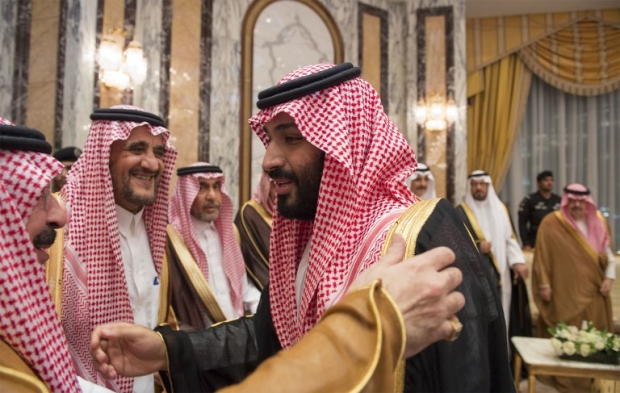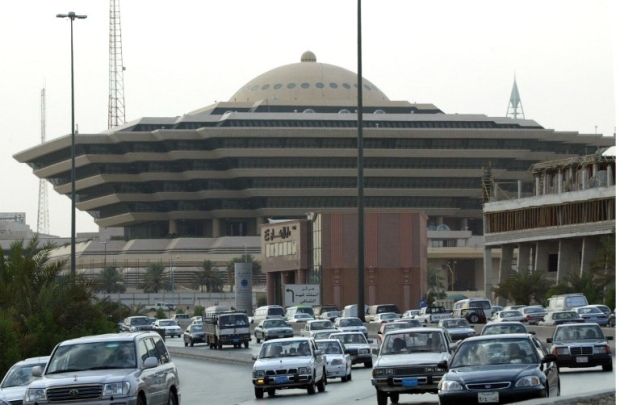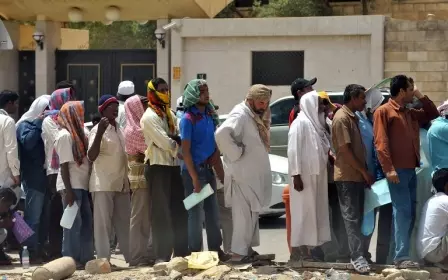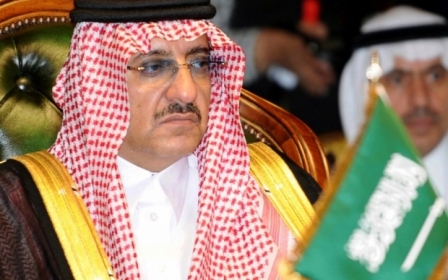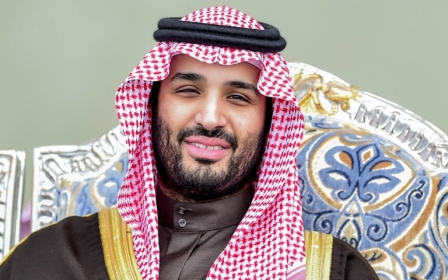Saudi Arabia's armed forces: This time it's reform, not a power grab
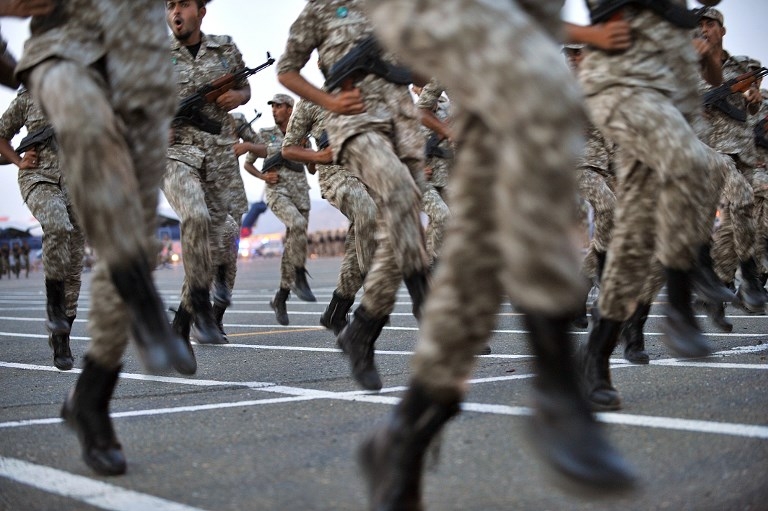
This article was originally published under the byline 'MEE Correspondent' to protect Jamal Khashoggi's identity. We are now adding his byline in a memorium to his work.
.Last week, Saudi Arabia witnessed the most important military restructuring with the separation of the kingdom's main security services from the mighty interior ministry. A similar move targeting the national guard is on the horizon
In light of the rapid rise to power of the young prince, Mohammed bin Salman, it would be easy to say that this reorganisation is just another power grab.
In Saudi Arabia, there's no party of MBN, nor is there one for MBS. Whoever believes that such loyalty will protect him would lose with the slightest change in power
Instead, this change should be seen as an overdue reform of the Saudi armed forces which have been scattered across three ministries without much coordination.
The "power grab" battle is over. Mohammed bin Salman has become the commander in the kingdom - and in the royal family as well - since that Ramadan night when his cousin, the former crown prince and interior minister, Mohammed bin Nayef, was deposed from power without a single tank.
In fact, the battle happened behind the closed doors of the Safa Palace in Mecca. Its tools were the distribution of money and positions among royals only. They are the final decision makers when it comes to succession matters in Saudi Arabia. The people or the members of the armed forces have nothing to do with it.
Last week, all of these forces were put under the presidency of state security, a new position which now answers to the king, who is the commander in chief of all forces - a major change made by a simple royal decree.
The Sacred Guardian
Western political analysts make a very common mistake when they apply what they know about the army-controlled Arab republics to the kingdom, which is still governed by the "Sacred Guardian" to whom expression of loyalty is dictated.
The unity of the family is still the most important characteristic of the rule of the Saud and that is perhaps so far the secret behind their survival
In fact, Saudi Arabia has not yet given up the traditions of absolute power that comes from Islamic traditional rule of the Imam or a Caliph.
For example, the relationship among members of the royal family cannot be compared to the case of the former Syrian president Hafez al-Assad and his brother, Rifaat, who formed his own armed forces. He tried to overthrow his brother in 1983 and lost a battle in which many people died. He ended up as a VIP refugee in Paris.
In Saudi Arabia all generals, for instance the chief of joint staff or the head of the general investigation service, is loyal to the king. He is the guardian who must be obeyed in the name of Islam. He trumps any immediate superior, even if he is a prince.
Moreover, in Saudi Arabia, there's no party of MbN, nor is there one for MbS. Whoever believes that such loyalty will protect him would lose with the slightest change in power.
Indeed, the unity of the family is still the most important characteristic of the rule of the Saud and that is perhaps so far the secret behind their survival. It is out of sheer wisdom that they maintain it, although it has been recently subjected to a violent shake after the ill-treatment of the former crown prince.
MbN is still respected within the family, which has accepted that the king wants to give power to his son, but they may not accept the humiliating treatment of his predecessor. Bin Salman needs to find a quick solution to this before it gets even worse.
Thanks to the "loyalty to the king only" rule, which was tested and confirmed on the night of 21 June when the second-most powerful man was overthrown, it is not expected that the head of the national guard, Prince Mutaib bin Abdulaziz, would resist another "reform" that would drastically restructure his forces.
This is because he knows that his men would not obey him if he attempted such a folly.
Now all he can do is to wait for the "reforms" coming to his ministry that would not even be a ministry if his father had not been a king and if he had not prepared himself to be where his younger cousin MbS now is.
Therefore, theories of the "centres of power" in Saudi Arabia should be set aside and positive consideration should be given to bin Salman's efforts to restructure the branches of the three Saudi armed forces.
Overdue reform
His decision (or the king's decision: there is no difference here) to remove several military bodies and authorities from the interior ministry was an overdue reform and the opportunity to apply it has now to be seized.
From its distinctive building in Riyadh, the Ministry of Interior supervises and plans everything that is related to the Saudi citizen from his birth certificate to his death certificate
The interior ministry has become a powerful giant. From its distinctive building in Riyadh, which looks like an inverted pyramid, the ministry supervises and plans everything that is related to the Saudi citizen from his birth certificate to his death certificate.
The ministry monitors his phone calls without his consent; it fights against terrorism; and organises Haj. To form an esteemed army to carry out these many and difficult tasks, it has stretched itself incredibly hard.
The idea of partitioning the ministry has been circulating since the time of its powerful minister, Nayef bin Abdulaziz, the brother of the current king, and the father of MbN, who died before he could come to the throne. However, of course, at that time, no one dared to ask him to do so. It was a different phase and, instead of splitting up the ministry, three Saudi armed forces were formed.
Together, they share crucial decisions, but with little joint planning and policy making. A lot of costly decisions were taken as a result of the strong prince's will, conviction and his desire to be distinct. For this reason, there is an air force not only in the Saudi army, but also in the interior ministry and national guard, for example. There were even independent schools and hospitals for the three of them with huge unchecked budgets.
Ending duplication
Bin Salman's restructuring is necessary and beneficial for the kingdom. The Yemen war revealed the three arms' lack of a single control and command room. The national guard, for instance, has become an army in its own right and has the technical capabilities to carry out operations even outside the borders, and not only internal defensive operations.
In addition, there is an even greater need to re-examine the justification for the existence of every armed unit and the role allotted to it. A lot of these units carry out repetitive actions that often overlap with the others.
The national guard itself needs to re-examine why it exists since it was formed to contain the volunteers who fought with the founding king and who were formed as tribal battalions. In the past, this was acceptable. Yet, the existence of military forces that allow tribal loyalty is not a wise thing in today's Middle East where people have become vulnerable to quick divisions over their minor identities.
Since Mohammed bin Salman has won the "Game of Thrones", he better do something useful and reorganise the Saudi Arabian army, especially given the challenges that the kingdom and the region face. And with this new strategy comes the wish, of course, that this shall go in line with even wiser political decisions.
- Jamal Khashoggi was a Saudi columnist and General Manager of Alarab News Channel.
The views expressed in this article belong to the author and do not necessarily reflect the editorial policy of Middle East Eye.
Photo: Saudi Interior Ministry special forces parade in October 2012 in Mecca ahead of the hajj pilgrimage (AFP)
New MEE newsletter: Jerusalem Dispatch
Sign up to get the latest insights and analysis on Israel-Palestine, alongside Turkey Unpacked and other MEE newsletters
Middle East Eye delivers independent and unrivalled coverage and analysis of the Middle East, North Africa and beyond. To learn more about republishing this content and the associated fees, please fill out this form. More about MEE can be found here.



